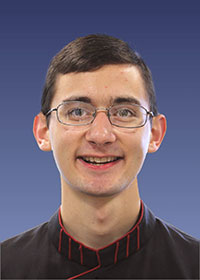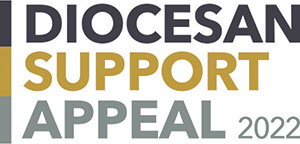 CHARLOTTE — Little did Michael Camilleri know that when he entered the Diocese of Charlotte’s seminarian program, he’d also learn how to cook besides discerning the priesthood and earning a degree from Belmont Abbey College.
CHARLOTTE — Little did Michael Camilleri know that when he entered the Diocese of Charlotte’s seminarian program, he’d also learn how to cook besides discerning the priesthood and earning a degree from Belmont Abbey College.
During his final year at the college seminary in Mount Holly, Camilleri has served as head seminarian of the kitchen and trained at Aqua e Vino in Charlotte to bone up on his culinary skills and learn how to make Italian dishes from scratch.
Knowing how to cook is important, Camilleri realizes. “It can be difficult for a priest who can’t cook to eat well.” Now, he adds, “I’m trying to train up the rest of the guys.”
“One of the favorite dishes the men have enjoyed is a baked rice dish from Malta, where much of my family is from,” he says.
Camilleri, a member of St. Elizabeth Church in Boone, is one of 45 men enrolled in various stages of formation for the priesthood in the diocese. He just finished his studies at St. Joseph College Seminary in Mount Holly, earning a bachelor’s degree from nearby Belmont Abbey College.
He plans to go on to continue formation for the priesthood at Mount Saint Mary’s Seminary in Cincinnati this fall.
CNH: When did you first consider the priesthood?
Camilleri: I first heard the call to the priesthood when I was very young – 3 or 4 years old. My family loves to talk about how I used to “play Mass,” which is actually one of my earliest memories. I lost sight of the vocation in late elementary school until right before high school – I wanted to go into computer science.
While preparing to enter high school, by the grace of God, I decided to pursue what He put on my heart from that early age and I entered the college seminary.
CNH: How did you go about discerning where you felt called to explore a possible vocation?
Camilleri: I was always open with my family about my thoughts on the priesthood, but the first person outside my family whom I spoke with was probably Father Robert Ferris, my pastor at the time. Later, at the beginning of high school, when I was more seriously discerning, I spoke with my pastor Father Matthew Codd.
The diocese’s Quo Vadis Days retreat was invaluable for my discernment because I was able to see and speak with many priests in both formal and informal settings. They also gave us a taste of the rhythm of prayer life in seminary, including Holy Mass, praying the Divine Office and Eucharistic Adoration. I also remained active in my parish and asked Our Lord numerous times for guidance. The most important part of discernment is prayer.
CNH: How and when did you reach out to learn more?
Camilleri: I have a very precise answer for this. I reached out to the Vocations Office by email on October 26, 2014, at 9:41 p.m. My email is a bit funny to read back. It begins “Dear Fr Gober, My name is Michael Camilleri, and I am 14 years old. I am discerning diocesan priesthood, but because I am 14, I’m far too young to go to seminary.” When I read back over the rest of my message to Father Gober, I imagine he must have had a good laugh.
CNH: You entered St. Joseph College Seminary in 2018 after graduating from high school. What has been your discernment process there?
Camilleri: The most important part of one’s prayer life is the Holy Sacrifice of the Mass, the unbloody re-presentation of Christ’s own perfect Sacrifice on Calvary. I think I could count on my fingers the number of days I have not attended Holy Mass since I entered the seminary. I fervently love the elevations of the Sacred Body and Blood of Our Lord during the Mass, during which one can adore Our Lord in the flesh and pray that indulgenced prayer along with St. Thomas: “My Lord and My God.”
We seminarians also spend time before the Blessed Sacrament, we pray the Divine Office, and we pray the rosary.
Complete abandonment to God’s will is essential, I think. Psalm 126 says, “Unless the Lord build the house, they labor in vain that build it.” Unless we abandon ourselves to His will and say with Our Lord, “Thy will be done,” our work is in vain. If, however, I offer all my little daily actions to God for Him to use as He pleases, I will surely not toil in vain. God takes care of the rest.
CNH: Looking back on your discernment journey to this point, what do you think has helped you the most to discern God’s will for you?
Camilleri: Ultimately, it is God’s grace that has guided me. I have certainly made my own contributions – attending Holy Mass, all other forms of prayer, being open to God’s will – but all of this amounts to nothing other than following His will. I ask the Blessed Trinity that I continue to follow His will, and I ask the reader to please pray for that, as well.
— SueAnn Howell, senior reporter
Your DSA contributions at work
Seminarian education is funded in part by the annual Diocesan Support Appeal.
Learn more about the DSA and how to donate online at www.charlottediocese.org/dsa.



